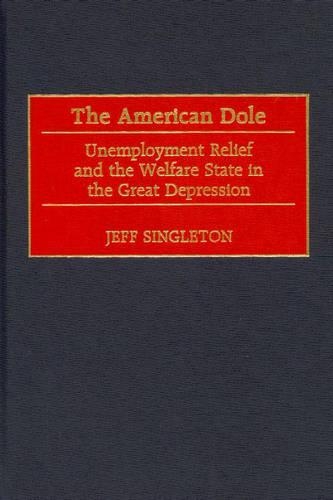
The American Dole: Unemployment Relief and the Welfare State in the Great Depression
(Hardback)
Publishing Details
The American Dole: Unemployment Relief and the Welfare State in the Great Depression
By (Author) Jeff Singleton
Bloomsbury Publishing PLC
Praeger Publishers Inc
30th September 2000
United States
Classifications
Tertiary Education
Non Fiction
Welfare and benefit systems
History of the Americas
Social and cultural history
368.440973
Physical Properties
Hardback
256
Description
As Jeff Singleton shows, the rapid expansion of unemployment relief in the early 1930s generated pressures which led to the first federal welfare programs. However the process has received relatively little attention from historians, and unemployment relief does not play a major role in discussions of the current state of welfare. Singleton seeks not only to fill this gap, but to challenge popular interpretations of relief policy in the early 1930s. He shows that relief was expanding prior to the depression and that the modern aspects of social policy implemented in the 1920s profoundly influenced the response of the welfare system to the early stages of the economic crisis. Relief under President Herbert Hoover was neither primarily voluntarist nor traditional. The first full-fledged federal welfare program was implemented under the Hoover administration by the Reconstruction Finance Corporation. The initial goals of the New Deal's Federal Emergency Relief Administration were to reduce the national relief caseload and the federal welfare role, while improving standards for those on the dole. The institutionalization of state-level welfare was a consequence of the failure of the 1935 reform program (the WPA and the Social Security Act) to eliminate the dole, not a product of conscious liberal policy. Singleton concludes by evaluating the 1996 Personal Responsibility Act in the context of these conclusions. If the dole was not a product of liberal reform, but, instead, arose to fill a policy vacuum, then it will be difficult to eliminate by legislative fiat unless states and the federal government are willing to finance relatively costly alternatives. A provocative analysis of interest to historians and social scientists concerned with American social and labor policy.
Reviews
.,."offers some thoughtful suggestions for the historical study of New Deal relief and welfare."-Journal of Interdisciplinary History
...offers some thoughtful suggestions for the historical study of New Deal relief and welfare.-Journal of Interdisciplinary History
In this detailed, fascinating, and well-researched study, Jeff Singleton of Boston College points out the rarely examined rise in relief caseloads between 1930 and 1935. His subtle revisionist interpretation challenges current understanding of the central inportance of the passage of the Social Security Act of 1935 in arguing that the Hoover and Roosevelt administrations intended to end "the dole"-direct cash or in-kind relief to the unemployed...This extremely valuable study points to the significance of politics, institutions, and conflicting agendas for change, which often led to unintended consequences, in supplementing new social historians' findings about social welfare history through the prisms of gender, class, and race.-The Journal of American History
Jeff Singleton has provided a useful addition to the growing literature on the development of American social policy....Singleton's exhaustively research work helps clarify the historical contours of U.S. social provisions. Although, conclusions will be of primary interest to academic specialists and graduate students, they also convey an important lesson to current policymakers.-History: Reviews of New Books
Singleton presents an interesting and detailed account of Depression-era relief programs in the United States, and he provides new insight into the manner in which those programs evolved from the pre-Depression relief system.-The Journal of Economic History
This well-researched, dense monograph challenges many of the historical interpretations of the oigins of the US welfare state, focusing mainly on the unemployment relief system of the early Depression years, 1932-35....This revisionist work should be read by anyone interested in the history of the US social welfare state. Upper-division undergraduate and graduate libraries.-Choice
..."offers some thoughtful suggestions for the historical study of New Deal relief and welfare."-Journal of Interdisciplinary History
"Jeff Singleton has provided a useful addition to the growing literature on the development of American social policy....Singleton's exhaustively research work helps clarify the historical contours of U.S. social provisions. Although, conclusions will be of primary interest to academic specialists and graduate students, they also convey an important lesson to current policymakers."-History: Reviews of New Books
"Singleton presents an interesting and detailed account of Depression-era relief programs in the United States, and he provides new insight into the manner in which those programs evolved from the pre-Depression relief system."-The Journal of Economic History
"This well-researched, dense monograph challenges many of the historical interpretations of the oigins of the US welfare state, focusing mainly on the unemployment relief system of the early Depression years, 1932-35....This revisionist work should be read by anyone interested in the history of the US social welfare state. Upper-division undergraduate and graduate libraries."-Choice
"In this detailed, fascinating, and well-researched study, Jeff Singleton of Boston College points out the rarely examined rise in relief caseloads between 1930 and 1935. His subtle revisionist interpretation challenges current understanding of the central inportance of the passage of the Social Security Act of 1935 in arguing that the Hoover and Roosevelt administrations intended to end "the dole"-direct cash or in-kind relief to the unemployed...This extremely valuable study points to the significance of politics, institutions, and conflicting agendas for change, which often led to unintended consequences, in supplementing new social historians' findings about social welfare history through the prisms of gender, class, and race."-The Journal of American History
Author Bio
JEFF SINGLETON has taught American history at a number of universities and community colleges. He also has done research for and been active in community organizations, advocacy groups, and human services organizations. He presently is teaching at Boston College.
